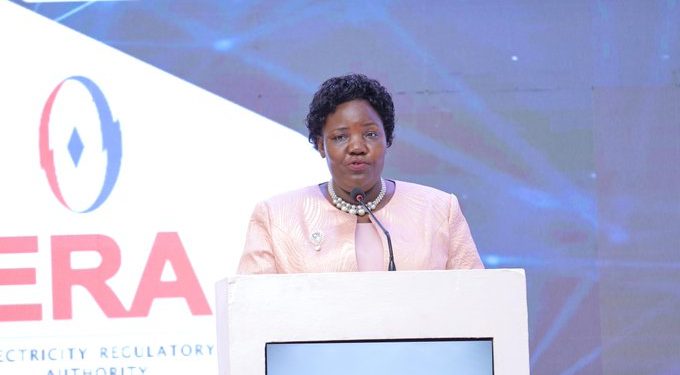Efforts to make electricity more affordable and reliable in Uganda are underway, following the end of the UMEME concession in March 2025, Electricity Regulatory Authority (ERA) Chief Executive Officer, Eng. Ziria Tibalwa Waako has said.
Speaking at the 16th National Competitiveness Forum (NCF16) held at Golf Course Hotel in Kampala, Eng. Tibalwa Waako highlighted the government’s move to regain control of the distribution network through the Uganda Electricity Distribution Company Limited (UEDCL).
“Previously, the high cost of capital brought into the distribution segment by UMEME was filtering through to the end-user tariff, making electricity expensive and undermining our goal of affordability,” she said. “Now that the government has regained control, we are working closely with UEDCL to improve the grid amid a rapidly growing demand for electricity.”
Eng. Tibalwa Waako acknowledged that electricity reliability remains a challenge but assured stakeholders that steps are being taken to upgrade the network. “The network needs upgrading, and procurement for new materials and services is ongoing. Government has supported us by accrediting UEDCL to procure directly, which will shorten the process,” she noted.
She also emphasised local content in electricity distribution, citing the Buy Uganda, Build Uganda (BUBU) initiative. “Many of our distribution transformers and meters are produced locally. However, even local manufacturers face delays because they must import copper and other components. We are addressing these gaps to ensure timely delivery and installation,” she explained.
Funding for network upgrades is in place, with over USD 100 million available. Eng. Tibalwa Waako said the priority is aligning frameworks, contracts, and suppliers to ensure that UEDCL can deliver service levels that exceed those previously offered by UMEME.
“Our goal is to improve the quality and reliability of power — reducing outages, eliminating ‘dim lights,’ and ensuring that electricity supplied is usable and sufficient to drive Uganda’s industrialisation agenda,” she said.
The ERA CEO also highlighted the benefits of off-peak tariffs for industries. “Between midnight and early morning, electricity is extremely cheap — about 200 shillings per unit or less. We should explore how industries can take advantage of that window to reduce overall energy costs,” she said.
On skills development, Eng. Tibalwa Waako conveyed a message from Allen Kagina, Chairperson of the Technical, Vocational, and Educational Training (TVET) Council. She invited stakeholders to join Skills Expert Committees working on a new curriculum designed to ensure graduates are employable and industry-ready.
TVET is now structured around three pillars: policy, regulation, and assessment, she said, emphasising a “360-degree shift” to align skills development with market needs.
The NCF16, which focuses on agro-industrial development, particularly cereals, grains, and animal feeds, brought together stakeholders to explore regional and international market opportunities. According to a recent International Trade Centre survey, 96% of Ugandan food processors are keen to explore new markets within and beyond Africa, while 80% are seeking to diversify their product offerings.









